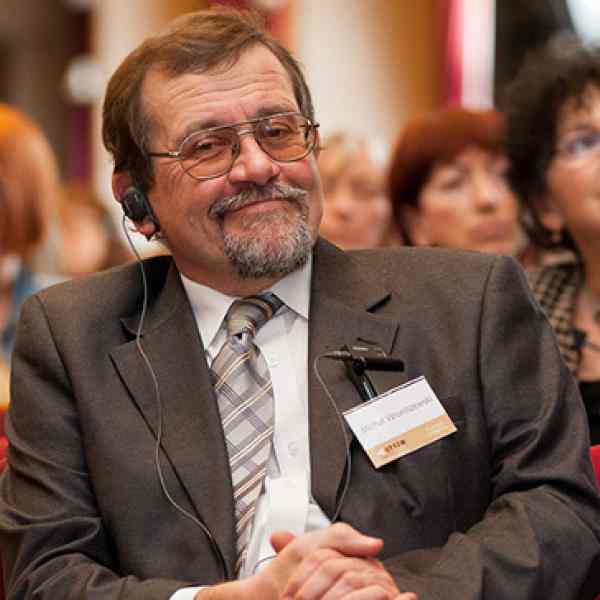Introduction
Michal Wroniszewski, a physician, is creating a national movement to accept disabled or "special" individuals as integrated members of society in Poland, with a primary focus on autistic and mentally retarded children and their families.
The New Idea
Michal Wroniszewski is a senior member of the Polish health care establishment, and he is building a public movement to accept and care for children who are different–and their families–by changing public attitudes. His vision incorporates the insight that when public opinion shifts, public policy and national budgets are likely to follow, and that it costs less to bring the special individual into the society than to pay for maintaining him or her as a dependent "outsider." He focuses on the needs of autistic and mentally retarded children, though his project is readily adaptable to any group that needs care. As a part of his commitment to changing the public mind, Michal is showing that autistic and mentally retarded kids, as well as others with disabilities, have far more capacity to develop than is generally believed, depending on the quality of love and patience they receive; and that the families of such children merit special appreciation and support from their communities. He is convinced that, especially in a developing democracy like Poland, it is essential to understand people who are different. After many years of professional and personal experience, he knows that understanding the uncommon world of "special children" and their families is not only a professional challenge but also an exciting opportunity: such a vision challenges all exclusive social systems at their root.
The Problem
Polish society is preoccupied with overcoming the economic hardships that followed the fall of the totalitarian system. The health and educational systems have been left behind–in thinking and techniques as much as in finance. Many disabilities are poorly understood, especially autism, which is a central part of Michal's focus. There is little preparation for teachers to work with unusual learning needs, so that many "special" children drop out of the educational system or never enter it at all.
The families of disabled children often experience deep crises of concern about how to care for their children's needs, helpless feelings and pervasive loneliness. Their living standard generally falls (since one member has to quit his or her job to stay with the child), and divorce is common. These families urgently need support and hope, but they are an insignificant political constituency and opportunities for them to support one another are rare.
The Strategy
Michal's strategy for building a national movement is to construct a series of interwoven networks and to work on all fronts to educate the public about "special" individuals. He has developed a system to contact and reach Polish families with autistic and retarded children, through letters, meetings and newsletters. More than 300 families were involved in the system within its first year. Michal seeks to provide some realistic hope, positive energy and information about how to contact the emerging networks. The families are crucial: once organized, they become a powerful engine for social change on behalf of their children.
Second, Michal seeks to build a modern profession of helpers. He works to bring together many professional and para-professional groups using lectures, workshops and a series of special annual and bi-annual professional programs. Like the families, the professional support population has a distinctive strategic power: Michal is committed to encourage people who are involved with Poland's most influential institutions to change them from the inside. Criticism from the outside is not enough. Therefore, for example, Michal joined the Polish Institute of Mental Health (a national supervisory institution) so that he could also have formal influence on mental health care for Polish children through its oversight roles.
Third, Michal seeks to involve as many social groups as possible, including community support groups, volunteers and conscientious objectors who refused military service and must instead serve in civil institutions. He has created a network of active grassroots organizations in twelve major Polish cities (Warsaw, Krakow, Wroclaw, Torun, Gdansk, Lodz, Szczecin, Poznan, Lublin, Przemysl, Opole and Oswiecim).
Michal constantly works to provide information to the public, knowing that increased public awareness is his great ally. He has established a national Annual Autism Day, on which posters are placed all over Poland, and he works with the media to concentrate on that subject. He has created an experimental training program geared toward understanding autistic children and their problems, for children from families that experience alcohol abuse; the young volunteers take part in programs for autistic and retarded children and then go door to door to inform the adults in their communities about the problems of autism and ask them to help. This activity has provided the "at risk" children with a goal and gained substantial donations for the program. Michal has also cooperated with Ashoka Fellow Krzysztof Liszcz.
The Person
Michal's family has a long tradition of social entrepreneurship. He himself was active since the early 1970's as a member of the Catholic Club of Intellectuals, one of the few free institutions under the communist regime. He was also involved in the 1970's in KOR, the Polish political underground opposing the totalitarian system, and in the 1980's in the Solidarity movement. During the period of martial law after 1981 he created a group that cooperated with underground Solidarity leaders.
He is a psychiatrist and since the mid 1970's has been the leader of an outstanding and innovative Community Mental Health Center called "Synapsis."
He has an autistic son, Dominik, who was born in 1982. Since that time, Michal has dedicated himself to creating a humane and efficient network for Polish special needs children and their families.
